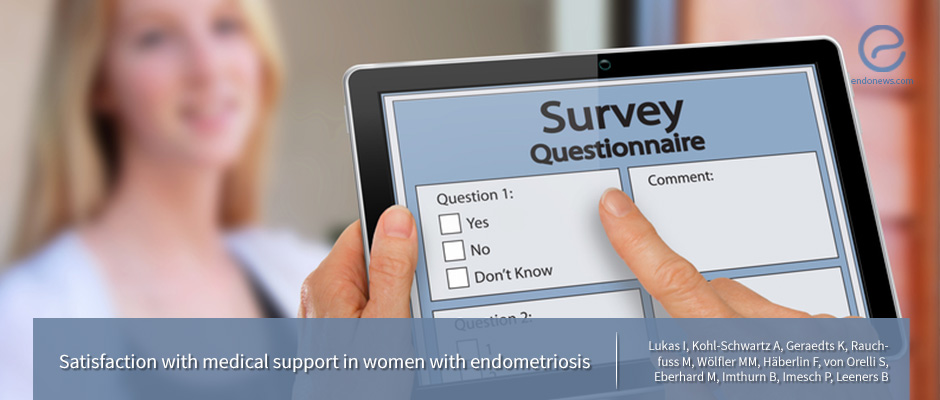Are women with histologically confirmed endometriosis satisfied with their medical support?
Dec 18, 2018
Informing patients about the disease by healthcare providers increases patient satisfaction with a medical support.
Key Points
Highlights:
- The adequate information about endometriosis, especially during the first consultation, improves patients’ compliance and satisfaction with medical support (PSwMS).
Importance:
- Patient satisfaction with medical support in women with endometriosis is a very important issue to improve the success of the treatment.
What’s done here?
- This multicenter retrospective cohort study performed in Switzerland, Germany, and Austria evaluates patient satisfaction with medical support in women with histologically confirmed endometriosis.
- A standardized questionnaire from 478 women, prepared by specialists for endometriosis and psychosomatic medicine were recruited.
- Questionnaires focusing on sociodemographic data and questions about the satisfaction with medical support were prepared by specialists for endometriosis and psychosomatic medicine.
- The provided information and education of the patients about endometriosis during consultation were assessed by 20 questions in 4 groups (communication, interpersonal, expertise and therapy).
- Appropriate statistical tests were used to evaluate differences between satisfied and dissatisfied women, and multiple logistic regression analysis performed to identify predictors for PSwMS.
Key results:
- A total of 272 women (54.6%) were satisfied with their medical support whereas 226 patients (45.4%) were dissatisfied with their medical support.
- Women given information about the disease during the first consultation were significantly more satisfied with medical support.
- Women reported that medical counseling should be included pain management, fertility, and mental health support.
- When the results obtained from women participating in self-help groups and recruited in hospitals or private offices were compared, most medians were lower in women participating in self-help groups compared to the women recruited in hospitals or private offices.
- Better education on endometriosis including information about cause and healing by healthcare providers is the most frequent suggestion to improve medical support.
Strengths and Limitations
- The big sample size, inclusion of only women with histologically confirmed diagnosis represent the strength of this study.
- The separate evaluation of women participating in self-help groups and women recruited in hospitals or private offices and allowing them to present their suggestions about the improvement of medical support also increase the reliability of the study.
- The possibility of changing PSwMS over time and recall bias and study design allowing no reliable statement on causal effects were the limitations of this study.
Lay Summary
Endometriosis is defined as the localization of endometrial glandular and stromal cells outside the uterine cavity. The most common symptoms are dysmenorrhea, dyspareunia, chronic pelvic pain, dyschesia, dysuria, musculoskeletal pain, fatigue and infertility, all of which affect the quality of women’s lives.
Most women with endometriosis experience a diagnostic delay of 10 years on average. The most important reason for this delay is the patient’s dissatisfaction.
Lukas et al, a group of scientists from Switzerland, Germany and Austria published a multicenter retrospective cohort study titled as “Satisfaction with medical support in women with endometriosis” in the journal named PLoS One.
The authors sought to evaluate the patient satisfaction with medical support in women histologically confirmed endometriosis performing a questionnaire. They found that most women are not satisfied with their medical support especially due to the lack of adequate information by healthcare providers during the first consultation.
"To achieve PSwMS, we have to take the time to inform and educate patients not only during the first consultations, but also in consecutive ones; need to show all treatment options to let them adequately participate in therapeutic decisions; treating them with empathy to create a good relationship are mandatory for PSwMS. Delicate topics like sexuality should be integrated, symptoms and psychological strains acknowledged, and interdisciplinary support offered when needed and wanted.” they added.
Research Source: https://www.ncbi.nlm.nih.gov/pubmed/?term=30496315
endometriosis personal satisfaction questionnaire medical support consultation

